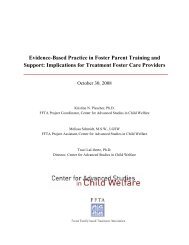Independent Living Program - Florida's Center for Child Welfare
Independent Living Program - Florida's Center for Child Welfare
Independent Living Program - Florida's Center for Child Welfare
- No tags were found...
You also want an ePaper? Increase the reach of your titles
YUMPU automatically turns print PDFs into web optimized ePapers that Google loves.
National Youth in Transition DatabaseDraft- Draft-DraftBackgroundIn 1999, Congress passed Public Law 106-169, establishing the John H. Chafee Foster CareIndependence <strong>Program</strong> (CFCIP), amending section 477 of the Social Security Act. This lawexpanded state funding to carry out programs to help youth transition from foster care to selfsufficiency.The law also required the federal Administration <strong>for</strong> <strong>Child</strong>ren and Families (ACF)to develop a data collection system to track independent living services states provide to youth,and develop outcomes to measure states’ success in preparing youth <strong>for</strong> independent living. Thelaw requires ACF to impose a penalty of between 1 and 5 percent of states’ annual Chafeeallotment <strong>for</strong> any state that does not comply with the reporting requirements.To meet this mandate, ACF published a rule in the Federal Register on February 26, 2008. Therule establishes the National Youth in Transition Database (NYTD) requiring states to conductclient-specific data collection activities on an ongoing basis. The rule directs states toincorporate NYTD in<strong>for</strong>mation collection and reporting through their Statewide Automated<strong>Child</strong> <strong>Welfare</strong> In<strong>for</strong>mation System (SACWIS), Florida Safe Families Network, in Florida.Florida must develop a youth survey tool, similar to the <strong>Independent</strong> <strong>Living</strong> Checklist, and addFSFN functions in order to transmit this federally required in<strong>for</strong>mation to ACF.OverviewThere are two major components to NYTD:1) Caseworker Piece – There are 14 categories of independent living services to youththat must be reported by the caseworker. Every six months Florida must report the all<strong>Independent</strong> <strong>Living</strong> and/or financial services to the “served population” PAID <strong>for</strong> orprovided by sub-contracted services providers. This report must be produced from theSACWIS system and it is regardless of age and foster care status (youth in DJJ,relative placements, out-of-home care, in-home). The service categories are: <strong>Independent</strong> living skills needs assessment Academic Support Post-secondary academic support Career Preparation Employment programs or vocational training Housing education and home management training Budget and financial management assistance Health education and risk management Family support and healthy marriage education Mentoring Supervised independent living Room and board financial assistance Education financial assistance Other financial assistance
















